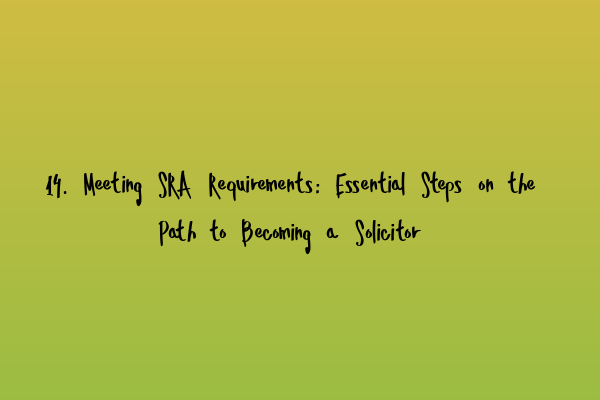Meeting SRA Requirements: Essential Steps on the Path to Becoming a Solicitor
Are you dreaming of a successful career as a solicitor? Well, you’re not alone. Many aspiring legal professionals navigate the challenging road to becoming a solicitor each year. With the introduction of the Solicitors Qualifying Examination (SQE), the journey to qualification has changed. In this comprehensive guide, we will walk you through the essential steps to meet the Solicitors Regulation Authority (SRA) requirements and help you achieve your goal of becoming a solicitor.
1. Understanding the SQE
The first step towards becoming a solicitor is to gain a crystal clear understanding of the SQE. The SQE is a two-part examination that tests candidates’ knowledge and skills in a wide range of legal areas. It replaces the previous training contract route and provides a more flexible pathway into the legal profession.
For a detailed insight into the SQE, check out our article on Solicitors Qualifying Examination (SQE): Your Gateway to Legal Practice.
2. Legal Work Experience
The SRA requires aspiring solicitors to gain a minimum of two years’ qualifying work experience (QWE) before being admitted as a solicitor. This experience can be obtained as either a legal practitioner or as part of a recognized training program.
During this period, it’s crucial to undertake various legal tasks and gain a well-rounded experience that reflects the skills and competencies outlined by the SRA. To develop your practical legal skills, nothing beats real-life scenarios. We recommend reading our article on SQE Case Studies: Applying Knowledge in Real-Life Scenarios to help you understand the practical application of legal knowledge.
3. Professional Skills
The SQE places a strong emphasis on the development of professional skills. As an aspiring solicitor, you must showcase your competence in areas such as legal research, drafting, advocacy, client interviewing, and negotiation.
Mastering these skills will not only enhance your chances of success in the exams but will also equip you with the tools needed to excel in your future legal practice. To improve your time management skills and efficiency during the SQE, refer to our article on Mastering Time Management in SQE: Strategies for Efficient Exam Completion.
4. Preparing for SQE1 and SQE2
The SQE is divided into two parts: SQE1 and SQE2. SQE1 evaluates your functional legal knowledge through multiple-choice questions (MCQs) and legal research exercises. On the other hand, SQE2 assesses your practical legal skills through client interviewing, advocacy, and case and matter analysis.
To conquer the multiple-choice questions in SQE1 and improve your chances of success, read our article on Conquer the Multiple Choice Questions (MCQ) in SQE1.
5. Mock Examinations and Feedback
Mock examinations are an invaluable tool in your preparation for the SQE. They allow you to familiarize yourself with the exam format, identify areas of improvement, and gauge your level of readiness.
After taking mock exams, it’s essential to analyze your results and identify any weaknesses. For tips on how to effectively analyze your mock results, check out our article on Analyzing Mock Results for SQE: Identifying Areas of Improvement.
Conclusion
Achieving your goal of becoming a solicitor requires careful planning, dedication, and a deep understanding of the SRA requirements. By following the essential steps outlined in this guide, you will be well on your way to meeting the necessary standards and positioning yourself for success in the SQE.
For more comprehensive training and guidance on the SQE, visit SQE Exam Law at https://free-mocks-sqe-training.co.uk/.
